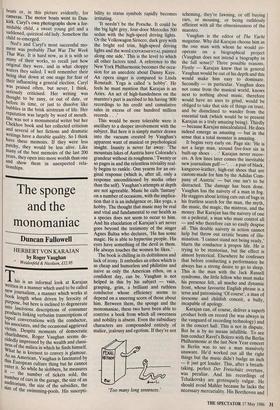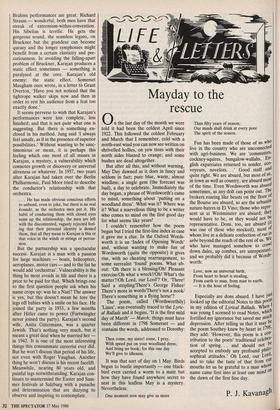The sponge and the monomaniac
Duncan Fallowell
HERBERT VON KARAJAN by Roger Vaughan
Weidenfeld & Nicolson, f12.95
This is an informal look at Karajan written in a manner which used to be called new journalism, a manner which works at book length when driven by ferocity of purpose, but here is inclined to degenerate into lascivious descriptions of consumer products linking verbatim transcriptions of taped conversations with the conductor, his associates, and the occasional aggrieved victim. Despite moments of democratic churlishness, Roger Vaughan seems de- cidedly impressed by the wealth and classi- ness of the milieu in which he finds himself. What he is keenest to convey is glamour. As an American, Vaughan is fascinated by this European culture thing but he cannot enter it. So while he slobbers, he measures It — the number of tickets sold, the number of cars in the garage, the size of an aUditorium the size of the subsidies, the size of the swimming-pools. His suscepti- bility to status symbols rapidly becomes irritating.
`It needn't be the Porsche. It could be the big light grey, four-door Mercedes 500 sedan with the high-speed driving lights.
Or the Volkswagon Sirocco, dark grey with the bright red trim, high-speed driving lights and the word EXPERIMENTAL painted along one side.' This is the level to which all other factors tend. A reference to the New York Philharmonic becomes the occa- sion for an anecdote about Danny Kaye. An opera singer is compared to Linda Ronstadt. Yoga is called `a hobby'. He feels he must mention that Karajan is an Aries. An act of high-handedness on the maestro's part is ascribed to his having '800 recordings to his credit and cumulative sales in excess of one hundred million records . .
This would be more tolerable were it ancillary to a deeper involvement with the subject. But here it is simply matter drawn into the vacuum created by Vaughan's apparent want of musical or psychological insight. Inanity is never far away: `The mountain lakes of Austria have Colorado's grandeur without its roughness.' Twenty or so pages in and the relentless triviality real- ly begins to rankle. One yearns for an ori- ginal response (which is, after all, only a response unconditioned by media other than the self). Vaughan's attempts at depth are not agreeable. Music he calls `fantasy' on a number of occasions, with the implica- tion that it is an indulgence or, like yoga, a hobby. The thought that music may be real and vital and fundamental to our health as a species does not seem to occur to him. And his elucidation of Karajan's art never goes beyond the testimony of the singer Agnes Baltsa who declares, `He has some magic. He is able to hypnotise people. His eyes have something of the devil in them. He always touches the women he likes.' The book is chilling in its doltishness and lack of irony. It embodies an ethos which is as cheap and humorless and philistine and naive as only the American ethos, on a confident day, can be. Vaughan is not helped in this by his subject — vain, grasping, grim, a brilliant and ruthless conductor whose efficiency seems to depend on a sneering scorn of those about him. Between them, the sponge and the monomaniac, these two have been able to contrive a book from which all sweetness and nobility is absent. Even the subsidiary characters are compounded entirely of malice, jealousy and egotism. If they're not `Too many long sentences.' scheming, they're fawning, or off buying cars, or moaning, or being ruthlessly efficient with all the obnoxiousness of the maestro.
Vaughan is the editor of The Yacht magazine. Why did Karajan choose him as the one man with whom he would co- operate on a biographical project (Vaughan does not intend a biography in the full sense)? Three possible reasons. Firstly — Karajan knew that in general Vaughan would be out of his depth and this would make him easy to dominate. Secondly — in particular, Vaughan does not come from the musical world, knows next to nothing about music, therefore would have no axes to grind, would be obliged to take that side of things on trust, and be disinclined to wander from the essential task (which would be to present Karajan as a truly amazing being). Thirdly — because Karajan miscalculated. He does indeed emerge as amazing — but in the sense that a total monster is amazing. It begins very early on. Page six: `He is not a large man, around five-foot six in built-up shoes . . Karajan never recov- ers. A few lines later comes the inevitable new journalism guff — . . a pair of black, kangaroo-leather, high-cut shoes that are custom-made for him by the Adidas Com- pany of Austria' — but one isn't to be distracted. The damage has been done. Vaughan has the naivety of a man in fog. He staggers about letting cats out of bags in his fruitless search for the man, the myth, the music, the magic, the mistress, and the money. But Karajan has the naivety of one on a pedestal, a man who must control all — and who therefore can so easily despise all. This double naivety in action cannot help but throw out erratic beams of illu- mination. `I cannot stand not being ready,' blurts the conductor a propos life. He is trying to be stentorian, but the effect is almost hysterical. Elsewhere he confesses that before conducting a performance he always has a strong desire to go to sleep. This is the man with the Jack Russell syndrome, the little fellow who must make his presence felt, all macho and dynamic front, whose favourite English phrase is a terse and patronising `Of course', a man of tiresome and childish conceit, a bully, incapable of apology.
Karajan can, of course, deliver a superb product both on record (he was always in the vanguard of recording technology) and in the concert hall. This is not in dispute. But he is by no means infallible. To see him conduct Ravel's Bolero with the Berlin Philharmonic at the last New Year concert in Berlin was to see a man massively unaware. He'd worked out all the right things but the music didn't budge an inch — it just got louder. This, after a breath- taking, perfect Der Freischiitz overture, was peculiar. And his recordings of Tchaikovsky are grotesquely vulgar. He should avoid Mahler because he lacks the necessary mercuriality. His Beethoven and Brahms performances are great. Richard Strauss — wonderful; both men have that streak of extremism-within-convention. His Sibelius is terrific. He gets the gorgeous sound, the seamless legato, on Bruckner but the grandeur can become queasy and the longer symphonies might benefit from a certain elasticity and pre- cariousness. In avoiding the falling-apart problem of Bruckner, Karajan produces a static effect sometimes — something is paralysed at the core. Karajan's old enemy: the static effect. Somerset Maugham once wrote, in a letter to Grant Overton, 'Have you not noticed that the tightrope walker skips now and then in order to rest his audience from a feat too exactly done.'
It seems perverse to wish that Karaj an's performances were less complete, less finished; and that is not quite what one is suggesting. But there is something en- closed in his method. Jung said 'I always feel unsafe, as if in the presence of superior possibilities.' Without wanting to be sanc- timonious or mean, it is perhaps this feeling which one most of all misses in Karajan, a mystery, a vulnerability which connotes growth or discovery or universal aliveness or whatever. In 1957, two years after Karajan had taken over the Berlin Philharmonic, Paul Moor tried to describe the conductor's relationship with that orchestra.
. . . He has made obvious conscious efforts to unbend, even to joke, but there is no real kontakt, as the orchestra men put it. His habit of conducting them with closed eyes sums up the relationship; the men are left with the discontented, vaguely rejected feel- ing that their personal identity is denied them, that all they mean to Karajan is this or that voice in the winds or strings or percus- sion.
But the partnership was a spectacular success. Karajan is a man with a passion for large machines — boats, helicopters, aeroplanes, motor cars — and to the list he would add 'orchestras'. Vulnerability is the thing he most avoids in life and there is a price to be paid for that. Which brings one to the first question people ask when his name crops up: was he a Nazi? The answer is yes, but this doesn't mean he tore the legs off babies with a smile on his face. He joined the party in 1933, a few months after Hitler came to power (Furtwangler never joined the party). Karajan's second wife, Anita Gutermann, was a quarter Jewish. That's nothing very much, but it meant a great deal when he married her in 1942. It is one of the most interesting things this consummate careerist ever did. But he won't discuss that period of his life, not even with Roger Vaughan. Another thing he won't discuss is his recent facelift. Meanwhile, nearing 80 years old, and painful legs notwithstanding, Karajan con- tinues to mastermind the Easter and Sum- mer festivals at Salzburg with a panache and determination that are dizzying to observe and inspiring to contemplate.



















































 Previous page
Previous page